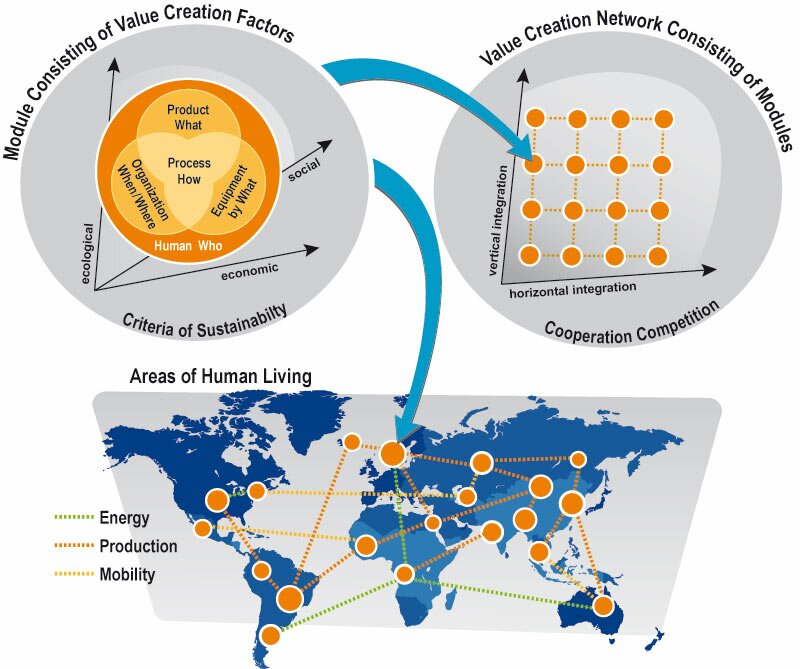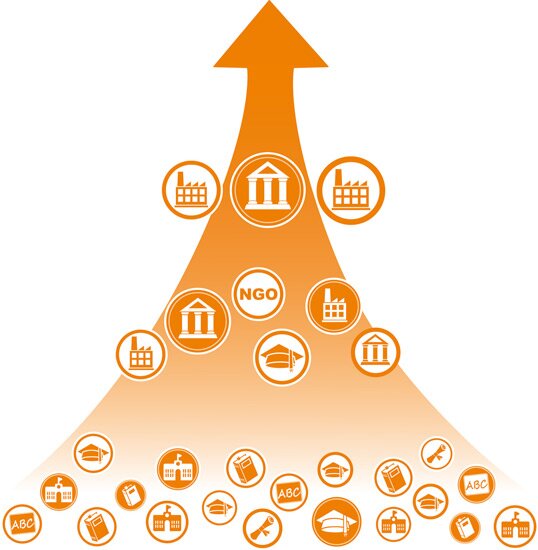Scientific Approach to Sustainable Value Creation
A special architecture integrates the research approaches of the different projects within CRC 1026 into an understanding of sustainable manufacturing:
Value creation is a matter of perspective and can be represented by modules and networks. Modules, in a bottom-up perspective, constitute networks by dynamics of cooperation and competition within the different levels of aggregation from manufacturing cells via lines, factories, enterprises, as well as local, regional, and global consortia in value creation for tangible and intangible products. On the other hand, in a top-down perspective, networks integrate modules horizontally and vertically again on different levels of aggregation. E.g. original equipment manufacturers look for innovative suppliers of physical components or services thus improving their competitiveness. Or communities look for educational partners to improve their social capital and thus their level of wealth.
 |
Modules consist of humans, processes, equipment, organization and product as so-called "value creation factors". They can be created or adapted in consecutive usage phases within product life cycles along setting up or modifying these factors. Modules are to be modeled and valuated on different levels of aggregation e.g. from a single workplace for component manufacturing to regional value adding in production equipment for mobility or energy as areas of human living. Valuation of modules in the sustainability perspective is no longer limited to economic criteria but also includes environmental and social factors.
Interdisciplinary Research for Sustainable Manufacturing
The TU Berlin is the institutional core of the CRC 1026. Disciplinary science clusters within CRC 1026 are manufacturing and environmental engineering, economics and mathematics. The collaboration of the four disciplinary science clusters is considerably inspired by the respective global science networks and close relations to practical implementation in science and industry in different regions of the globe.
Manufacturing engineering is by TUB Department of Machine Tools and Factory Management (IWF) withinthe school of mechanical engineering and transport systems cooperatively connected with Fraunhofer-Institute for Production Systems and Design Technology (IPK) in the common building of Production Technology Center (PTZ). Specific competences for materials and testing in manufacturing are provided by the Federal Institute of Materials Research and Testing (BAM) Berlin. Electronic competence for manufacturing equipment development is provided by TUB Research Center for Microperipheric Technologies and Fraunhofer Institute for Reliability and Microintegration (IZM). Environmental engineering is from TUB school of process sciences Department of Environmental Technology (ITU) and from TUB school of planning, building, environment Department of Landscape Architecture and Environmental Planning. Economics is from TUB Department of Economics and Economic Law connected with Social Science Research Centre Berlin (WZB). TUB Department of Mathematics in cooperation with Zuse Institute Berlin (ZIB) both integrated in the Berlin mathematical research network provide the mathematical competence.
Project Areas
 |
Bei nachhaltiger Produktionstechnik geht es um mehr als die reine Technologie. Die technologischen Lösungen müssen sich am Bedarf orientieren – einem zukünftigen Bedarf.
Sie müssen sich in vorhandene Produktionsstrukturen der globalen Wettbewerbsarena einfügen oder in der Lage sein, diese zu verändern. Sie müssen gesellschaftlichen Ansprüchen genügen, einer ökologischen Bewertung standhalten und wirtschaftliche Rentabilität versprechen. Schließlich müssen sie, wie jede Innovation, auch überzeugend vermittelt werden, um Anwendung zu finden.
 |
All diese Anforderungen spiegeln sich in dem ganzheitlichen Forschungsprogramm des SFB 1026 wider. Die produktionstechnischen Lösungen sind eingebettet in die Projektbereiche Strategiebildung und Wissensvermittlung. Die Mitarbeiterinnen und Mitarbeiter des Sonderforschungsbereichs nutzen ihr Expertenwissen aus den Feldern Ökonomie, Umwelttechnik, Sozialwissenschaften, Mathematik, Produktionstechnik, Informationstechnik und Öffentlichkeitsarbeit, um sich den anspruchsvollen Zielen des SFB in konkreten Projekten anzunähern.

![English [Beta] English [Beta]](/sfb1026_3.3-theme/images/language/en_GB.png)

